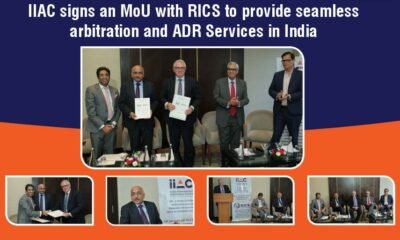News
India to become fifth largest infra market by 2030: RICS
India is set to become the fifth largest market in the world in infrastructure projects, up from 5.3 per cent in 2015 to 9.8 per cent in 2030, according to a recent RICS report ‘Our Changing World: Let’s be Ready’.
The report calls for action in six areas to support the profession and the sector in preparing for the challenges and opportunities. It examines how global social and economic changes will require new skills, business models and responses to developing technologies over the next 15 years.
“Real estate and construction sector in India is continuously evolving at a rapid pace. All stakeholders of this profession need to come together to attract high quality talent in this sector – something which we see as being critical in meeting long term growth,” Sachin Sandhir, Global MD – Emerging Business, RICS said.
RICS Chief Executive Officer Sean Tompkins said, “As a body that represents many of the professional disciplines so integral to the built environment, RICS can play an important role as a catalyst to bring people and organisations together, support businesses and ensure professionals in the built environment develop and further build on the skills needed to remain relevant in the future.”
He went on to say, “We recognise that we cannot not achieve this alone, it’s about collaboration – this report is an open invitation for firms, organisations and individuals who want to help ensure our sector is fit for future generations.” d.
The report draws on the views and perspectives of stakeholders from diverse specialisms and geographies across the surveying profession, globally. It captures the insights and expectations of what they project the most pertinent issues on the horizon will be leading to 2030. Through workshops, public forums and one-on-one interviews, more than 400 people from Asia, North America, South America, Europe and Africa shared their outlook of what the future may look like.
The report identifies six areas of action geared to the short to medium term that will support the profession and the sector in preparing for the challenges and opportunities these changes will generate. These actions include:
Helping our sector win the war for talent
Employers globally are faced with the need to maintain, and retain, a talent pool that is more diverse, inclusive and has the skills required to benefit the sector. A key endeavor is to attract talent that will meet the sector’s needs.
Having ethics at the heart of everything we do
Ethics is central to professional behavior within the built environment and related professions. RICS is currently working with a coalition of organisations to agree on a global set of International Ethics Standards (IES) that seeks to create high-level principles for global ethics. We are also working with the United Nations Global Compact (UNGC) to formulate best practices for business within the sector to meet global sustainability targets.
Creating successful and sustainable future cities
At present 54 per cent of the world’s population lives in cities. This is expected to rise to 66 per cent by 2050, according to projections by the United Nations. The profession has an important contribution to make in helping cities ensure that they become more resilient, sustainable and affordable for future generations.
Embracing technology and big data
Changing technologies and the ability to stay attuned to new innovations that impact on the sector are some of the important trends identified by professionals interviewed for this report. Development in digital technologies will impact on the creation of new business streams, the need for different skills and competencies and bring new risks with it.
Helping the surveying profession take new opportunities
The major social and economic changes we expect over the next few years will mean that surveyors, globally, will be required to adapt and hone their skills. The goal is to create a more dynamic profession with the ability to respond to market changes and the wider society in which it operates. We expect fields such as infrastructure, workplace, finance and technology to require more professionals, and for Asia to be the region with the strongest demand.
Developing strong leadership
Leadership is another issue professionals have themselves chosen as one that is central to an evolving profession. Many highlighted the need for the sector to work closer with governments to give the built environment a greater voice in influencing policy.
The report aims to identify the implications of rapid change for the built environment sector and aims to stimulate debate among practitioners in this sector and beyond. While this research report has been undertaken by RICS, Tompkins says the insights gathered apply to other sectors as well.
-



 News3 weeks ago
News3 weeks agoKW Delhi 6 Mall Onboards New Brands
-



 News3 weeks ago
News3 weeks agoManasum Senior Living Launches IKIGAI GOA, A Senior Living Community in North Goa, in collaboration with Prescon Homes
-



 News2 weeks ago
News2 weeks agoGodrej Properties Sells Rs 3k cr+ Homes of Godrej Zenith, Gurugram, within 3 days
-



 News3 weeks ago
News3 weeks agoBridging India Divide: Top 5 Tier- 2 Cities to Focus On
-



 News3 weeks ago
News3 weeks agoCommercial Realty Gets Tech Savvy: Fast Construction, Enhanced Convenience
-



 News3 weeks ago
News3 weeks agoMultipoint Connection – A Definite Boon
-



 News2 weeks ago
News2 weeks agoRBI’s Status Quo on Key Policy Rates to Help Maintain the Real Estate Growth Momentum, Say Industry Stalwarts
-



 News3 weeks ago
News3 weeks agoSacred Cities See a Retail Boom as Spiritual Tourism Surge: CBRE Report




























